From Korean Prison to Kabukicho Icon: The Yakuza’s Beloved Mama
A bar loved by yakuza
“A yakuza who doesn’t know her in Kabukicho must be an outsider.”
There is a unique woman who made even a senior member of a designated crime syndicate say this. Her name is Aki Nakagawa (36), who runs a bar in Tokyo’s Kabukicho. Behind the birth of a “bar loved by the yakuza,” frequented daily by gang members, lies the turbulent life of Ms. Nakagawa.
“I started working in the nightlife industry when I was 16. I became a hostess at a snack bar near the high school I was attending (laughs). Technically, a 16-year-old can’t legally work in the nightlife business, but the bar itself operated in a gray area. It was during the ‘kogal’ boom, so during the day, I’d hang out in Shibuya with my gal friends.”
From her teens, she earned money working at snack bars and cabaret clubs and roamed the streets of Shibuya. Then a turning point came in Nakagawa’s life.
“Around the age of 20, I got a call from a former black-suited staff at a cabaret club I used to work at. He said, ‘Do you know anyone who could go pick up a package in Malaysia?’ It was basically a courier job. At the time, I had quit nightlife work and was just drifting around. I didn’t think too deeply—figured going to Malaysia might be a nice change of pace—so I replied, ‘I’ll go.'”
In October 2008, Ms. Nakagawa received a ticket from a Japanese man, the coordinator, in the lobby of Narita Airport and headed to Malaysia. After arriving, she called the coordinator she had met at Narita and checked into a hotel in Kuala Lumpur as instructed. She was allowed to move freely for the first and second days, so she enjoyed shopping and clubbing, and on the third day, she was to receive the package.
Served three years in a women’s prison in South Korea
“The pickup location was a Starbucks in Kuala Lumpur. I was instructed by the coordinator to receive the package from a white man. When I walked to the Starbucks, just as I had been told, there was a large white man who handed me a carry-on suitcase without saying a word. It was an ordinary suitcase, nothing unusual about it. I was supposed to return to Japan with a layover in South Korea, but at Incheon Airport customs, the suitcase was flagged. That’s when I first learned that there was one kilogram of stimulants inside.”
Ms. Nakagawa was arrested on the spot and ended up serving a three-year sentence at Cheongju Women’s Prison, the largest women’s prison in South Korea. When her parents came to visit, they didn’t scold her — instead, they worried about their 20-year-old daughter. Moved by their kindness, she reportedly broke down in tears in the visitation room.
“In the South Korean prison, I wasn’t discriminated against for being Japanese. On the contrary, my cellmates all called me ‘Aki’ and treated me warmly. While incarcerated, I worked in the prison factory sewing clothes. I earned about 100,000 won a month (around 10,000 yen). In a Japanese prison, you’d never make that much.”
After her release, Ms. Nakagawa returned to Japan using a plane ticket arranged by the Japanese embassy in South Korea. However, she couldn’t hold down a job for long and eventually fell into alcoholism. Carrying around a bottle of shochu, she wandered the streets of Kabukicho — until one day, she was taken in by a woman, and that marked the beginning of a new chapter in her life.
The paid version of “FRIDAY GOLD” features Nakagawa’s account of how the bar beloved by Kabukicho’s yakuza came to be and the troubles that occurred at the restaurant.
PHOTO: Takayuki Ogawauchi
